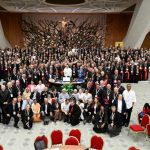The man President Donald Trump hailed as a “tough guy” who will bring stability to Syria is empowering extremists tied to Al Qaeda.
When Trump met Syria’s new leader, Ahmed al-Shara, in Riyadh, he couldn’t stop praising him. “He’s a young, attractive guy—tough guy,” Trump said. “He’s got a real shot at pulling it together.” The White House cast the meeting as a breakthrough, announcing sanctions relief and backing engagement with Shara’s government as a path to stability and an opportunity to counter extremists.
Trump even sent longtime ally Thomas Barrack as a special envoy, who praised Shara for “taking meaningful steps” on tackling foreign terrorist fighters.
But in the weeks since, Shara has done exactly the opposite. Rather than removing extremists, he’s absorbing them into his unified national army. The new government’s approach folds groups affiliated with the world’s most dangerous jihadists into Syria’s armed forces.
Up to 3,000 fighters from the Turkistan Islamic Party (TIP)—a Uyghur-led jihadist group tied to Al Qaeda—have been integrated into Syria’s new military under Shara’s watch. This isn’t happening in secret. “There is an understanding, with transparency,” Barrack said of the move, signaling that Washington gave it its blessing.
Some analysts argue that integrating the Turkistan Islamic Party into Syria’s army is a pragmatic move because TIP’s Syria branch has cut ties with Al Qaeda, its fighters cannot return home, and it is better to control them within the system than risk pushing them back into the arms of other extremist groups. Nevertheless, this argument ignores the fact that many of these fighters are still loyal to Al Qaeda’s leadership, have engaged in sectarian violence, and pose a serious threat to Shara’s authority, especially if he pursues policies they oppose.
Analysts who favor integration accept TIP’s claim that it no longer takes orders from its external leadership and Al Qaeda. But there is little indication that the TIP in Syria has severed its ideology or operations from Al Qaeda. Their leader, Abdul Haq al-Turkistani, is a longtime jihadist and member of Al Qaeda’s top leadership council, and according to the United Nations Analytical Support and Sanctions Monitoring Team, he still directs TIP’s operations inside Syria from Afghanistan. TIP targets China’s Xinjiang province, where it seeks to establish an Islamic emirate, but it also operates as part of Al Qaeda’s global network, with strongholds in Afghanistan and Pakistan.
Shara promoted Abdulaziz Khudaberdi, the TIP’s Syria branch leader, to brigadier general in the Syrian army in December 2024. Audio recordings reveal Khudaberdi’s unwavering obedience to al-Turkistani, further showcasing the strong affiliation with the TIP leadership in Afghanistan and, by extension, Al Qaeda.
Shara and his associates have sought to convince Western interlocutors that bringing foreign fighters into the army would be less of a security risk than abandoning them, which could drive them into the orbit of Al Qaeda or the Islamic State.
Shara is partially right about that: The most hardline of these foreign fighters are already turning against him. They are angry that their former comrade in arms has not yet imposed Sharia law and have alleged that “he has cooperated with the United States and Turkish forces to target extremist factions.”
Instead, the authorities are setting clear guidelines outlining how they expect the foreign fighters to behave. They are to avoid inciting sectarian or political violence and to refrain from calling for attacks on other countries.
The claim that appointing foreign commanders is an effective way to insulate the regime from coups is right, but if these groups continue to maintain operational ties with their parent organizations abroad, they may just be biding their time to assert their own agendas. Their loyalty remains uncertain, and the threat of defiance persists, especially if they don’t agree with how Shara implements Sharia law or establishing a security relationship with Israel.
Additionally, taking Shara at his word that excluding foreign fighters will push them toward Al Qaeda or the Islamic State ignores the fact that many of the groups he seeks to integrate are already part of Al Qaeda’s network. That includes the newly formed 84th Division, a unit that Syrian commanders have filled primarily with TIP militants and other foreign combatants.
Among these combatants is a group named Katibat al-Tawhid wal-Jihad (KTJ), an Uzbek and Kyrgyz faction that operates in both Syria and Afghanistan. Unlike TIP, KTJ is officially identified as a Specially Designated Global Terrorist group by the United States, and KTJ has remained loyal to Al Qaeda.
In December 2024, Shara promoted KTJ’s leader, Saifuddin Tojiboyn, to the rank of colonel. Following his appointment, Saifuddin shut down his Telegram channel and vanished from public view—likely an attempt to “hide his extremist credentials and his allegiance to Al Qaeda while Syria seeks international sanctions relief,” according to Uran Botobekov, an expert on Central Asian Jihadi movements. The presence of an individual like Tojiboyn in Syria’s new army shows that Washington is at risk of greenlighting the enlistment of terrorists from its own blacklist into Syria’s military ranks.
Many of Syria’s foreign fighters committed human rights abuses during the violent clashes along the Syrian coast in March 2025. Among them were Turkmen and Chechen militants. According to a resident of an Alawite neighborhood, these foreign fighters “were everywhere.”
These incidents showed the lack of control Shara has over the foreign fighters. The Interior Ministry’s directive amid the clashes was that “all pro-government forces should adhere to procedures used during the offensive against the Assad regime, namely, no targeting of civilians.” However, the killings continued. The involvement of foreign jihadists directly complicates the situation, as many of these fighters came to Syria for explicitly sectarian reasons.
Shara and his government say that he wants the state to control these foreign fighters, but the attacks against the Alawites proved the opposite. These fighters acted with impunity, and their sectarian motivations endure despite their army membership. With the country still vulnerable to this type of conflict, their presence risks igniting further violence and bloodshed.
Now, with Washington greenlighting their integration and with a dedicated unit established for them, it will be difficult for the Syrian government to root out groups like the TIP that have already been absorbed.
At the very least, Damascus must ensure that these fighters sever all ties with Al Qaeda and stop receiving directives from al-Turkistani and the rest of the leadership in Afghanistan, as well as renounce their affiliation with TIP. It will also be sensible to keep these units away from sectarian flashpoints such as the Alawite-majority Syrian coast or the Druze-dominated Suwayda Governorate.
In addition, placing these units under the command of professional Syrian officers who will ensure the units train and learn properly, rather than becoming jihadi pockets within the Syrian army, will also help monitor and contain any insurrections, especially if Syria begins moving toward normalization with Israel. Additionally, Shara must demonstrate accountability for the perpetrators of the March massacres. The fact-finding committee, tasked by Shara, has yet to complete its final report on the incidents. Still, if he hands out token punishments for mass murder, it will show that putting extremists in the army may do more to legitimize them than empower Shara and the Syrian state.
The Trump administration must also make clear to the Syrians that it will not tolerate the integration of foreign fighters designated as Specially Designated Global Terrorists or listed as Foreign Terrorist Organizations, such as Katibat al-Tawhid wal-Jihad, into Syria’s new army.
The United States must also communicate to Syrian leadership that the use of Syrian territory for cross-border attacks is a red line and that Damascus will be held accountable for harboring groups that intend to export terrorism beyond Syria’s borders. Finally, Washington should be ready to impose direct sanctions on specific military units, such as the 84th Division, if they engage in sectarian violence against Syria’s ethnic and religious minorities.
About the Author: Ahmad Sharawi
Ahmad Sharawi is a research analyst at The Foundation for Defense of Democracies, focusing on Middle East affairs, specifically the Levant, Iraq, and Iranian intervention in Arab affairs, as well as U.S. foreign policy toward the region. Previously, Sharawi worked at the Washington Institute for Near East Policy, where he focused mainly on Hezbollah. He created a map visualizing the border clashes on the Israeli-Lebanese frontier and authored articles on Jordan and Morocco. Ahmad previously worked at the International Finance Corporation and S&P Global. He holds a B.A. in international relations from King’s College London and an M.A. from Georgetown University’s School of Foreign Service.
Image: Mohammad Bash / Shutterstock.com.


















